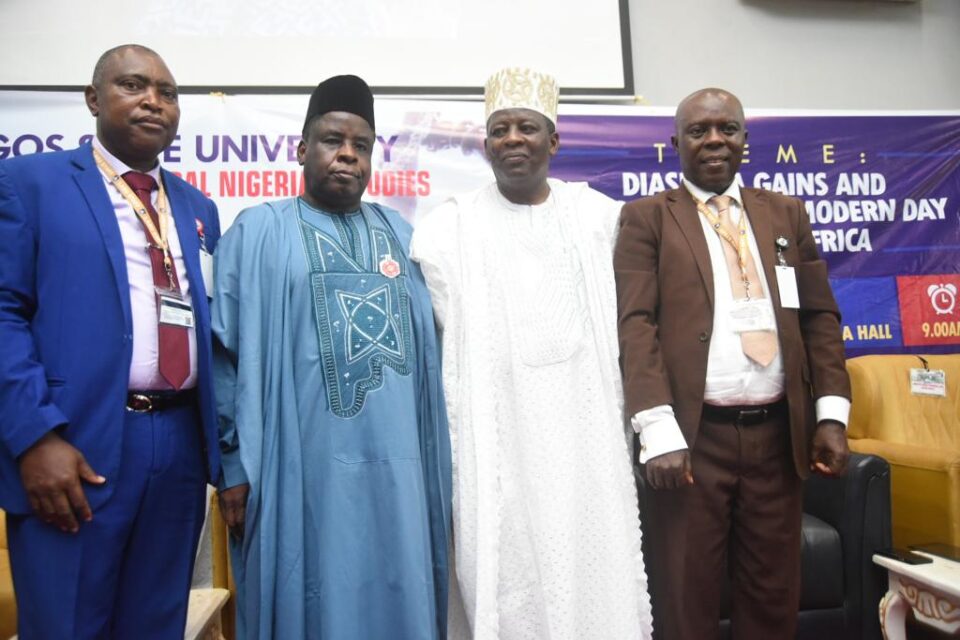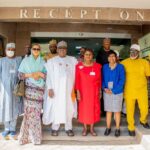L-R, Chairman, LOC, Prof. Olugbenga Akindoju, Executive Secretary, NiDCOM, Engr. Dr. Sule Yakubu Bassi, Keynote Speaker, Prof. Siyan Oyeweso, and Director, CGNS, Prof. M.O.B. Muhammed
By Cyriacus Nnaji
The latest movement of Nigerians, nay, Africans, to developed continents of the world in search of greener pastures, has become an issue of concern to individuals, organisations, the countries across Africa and even the globally. No wonder the Centre for General Nigeria Studies (CGNS) convened what it called an Education Summit 2023 to x-ray the burning subject.
The four-day summit with the theme “Diaspora Gains and the Question of Modern Day Slavery in Africa” which commenced Monday, 4th December and ends Thursday, 7th December, 2023, took place at the Makanjuola Lecture Hall, Lagos State University, at Ojo.
The Keynote Speaker, Professor Siyan Oyeweso from the Osun State University in his paper titled “From Trans-Saharan Slave Trade to Checking out, Sapa, Japa, Japada: Interrogating Issues in Brain drain, Brain gain and Modern Slavery”.
According to Oyeweso, Diaspora gain and modern-day slavery are two burning fundamental issues and great ills that have continued to beset and shape global human and state relations, saying “As the movement of people across national and international borders remains one of the core aspects of the global socio-economic and political value chain, it has become difficult, if not impossible, to take the issue of diaspora and modern-day slavery lightly, given its implications for sustainable growth and development on the African continent.”
He disclosed that no topic illustrates Africa’s current position in the international system better than the one on issues of slavery, migration and diaspora. “Africa’s history with the wider world is replete with these three fundamental themes. The concept and practice of slavery are not only attached to African history, but also the relationship between Africa and the West (the Global North) under the grip of the Trans-Atlantic Slave Trade and colonialism reshaped the frontiers and practices of slave trade and slavery, which is now assuming a new dimension.”
The erudite Professor added that some historical and contemporary concepts, such as the Africa Diaspora, the Black Atlantic and the Atlantic World denote centuries of population movement between Africa and the wider world. These events, according to him, have left significant imprints on African migration and transnational relations which justify the need to further interrogate these issues, not only to identify the context of the past but also to use the findings to reconsider the present and adequately prepare for the outcomes of the future of the African continent.”
Oyeweso said that Africa has been described as a continent on the move. “Africa has been described as a “continent on the move,” which signifies the continuous African movement from the continent primarily shaped by socio-economic and political forces rooted in Africa’s crises of attaining sustainable growth and development. Therefore, this academic conference is an inquiry into an important dimension of population movement from Africa to the global community.”
Speaking on what he called slavery and slave trade: a brief synopsis he said that no topic illustrates Africa’s position in the global system better than slavery, both as a system of trade and as an institution, adding that in addressing the context of diaspora gains and modern-day slavery, a crucial take-off point is to go down memory lane to adequately conceptualize the issue.
Oyeweso said although slavery and slave trade in Africa were domestic, they were one of the major developments in Africa that connected the continent to the wider world. “In fact, the global economic history that involves Africans cannot be complete without making proper reference to the issues and implications of slave trade. Also, African underdevelopment trajectories cannot be discussed without referring to the roles of slave trade. Walter Rodney’s seminal book How Europe Underdeveloped Africa remains a fundamental historical text that discusses the implications of slavery for Africa. Africans dominated the narrative of several global slave trade networks, such as the Trans-Saharan Slave Trade, the Trans-Atlantic Slave Trade and the India-Ocean Slave Trade. The volumes of this slave trade represented one of the most extreme forms of coercion, dehumanization, and commodification of human labour in global history.”
He stated that counting the cost of the slave trade in Africa remains one of the important aspects of slave trade history in Africa. “The implications of slave trade and slavery for Africa cannot be underestimated. The number of Africans that were enslaved had both demographic and development implications for the continent.”
On her part, Prof Ibiyemi Ibilola Olatunji-Bello, the Vice Chancellor of LASU, represented by Prof Olufunsho Omobitan, the Deputy Vice-Chancellor Academic, noted that Nigerian youths who migrate out of the nation in their numbers in search of greener pastures do so without any proper plan to mitigate the challenges they are bound to face in the other climes where they will face life as second class citizens.
The Vice Chancellor mentioned such challenges to include sex slavery, child labour, racism and other inhuman treatments.
Prof. Olatunji-Bello agreed that factors such as poverty, unemployment and other hash socio-econonomic challenges within have remained the compelling forces occasioning the mass exodus of the youth out of the country.
She said that she was challenging the Nigerian government to make Nigeria work and habitable for Nigerians so that the country would not continue to lose her best.
Prof Mubashiru Olayiwola Babatunde Mohammed, Director of the Centre for General Nigerian Studies (CGNS) conveyed message of hope for Nigerian, adding that Nigerians youths should stay back home and join hands with hope to build the country to the enviable height. “It is still possible. We can make it work. Yes, I know it’s not easy that even as a professor today, my take home is less that N450000, yet I believe that there is still hope for this country.”
He continued “You would recall that when I discharged my professorial inaugural lecture, I did recommend that the basic salary of a professor should be N1.5m while the starting pay of an Assistant Lecturer should be N350,000. Should this be done, we will then witness less of this Japa thing we are facing in the country and indeed, Africa”; Prof Mohammed stated.



